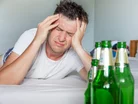Anti-hangover pill Myrkl may cause long-term health problems

During the COVID-19 lockdown period, everyday became a Friday and alcohol abuse soared. Restaurants were closed and people used drinking to cope with boredom, loneliness and stress. While many managed this alongside their responsibilities, others did not.
The British Liver Trust, a charity supporting those suffering from alcohol abuse, said it saw a 500% increase in calls since the first lockdown.
With that in mind - the arrival of a new anti-hangover supplement, Myrkl, has healthcare workers and charities worried.
Myrkl is an anti-hangover supplement
Myrkl (not named after the former Chancellor of Germany) is sold as an anti-hangover supplement. Two pills need to be taken throughout the day, before drinking alcohol. Mixed with L-cysteine and the vitamin B12, Myrkl works to reduce the absorption of alcohol by the body and are 100% vegan.
Myrkl has been recognised as safe by the European Food Safety Agency (EFSA) and the US Food Drug Administration (FDA).
Everything looks good on paper, but charities which work to support those struggling with alcohol are deeply concerned that Myrkl will cause huge damage to people’s health and wellbeing, as well as creating an additional workload for the healthcare industry.
“This pill means it will take longer for the effects of alcohol to be felt and that could lead to people buying and consuming more alcohol,” said Alison Douglas, chief executive of Alcohol Focus Scotland. “People may inadvertently end up drinking more than they normally would, putting them at risk of a range of long-term health conditions such as liver disease, heart disease and stroke, as well as at least eight different types of cancer including bowel and breast cancer.”
Håkan Magnusson, CEO over de Faire Medical, the company behind Myrkl, has said the pill was not designed as an excuse to drink over guidelines.
“Moderate social drinking is a huge part of [Western] culture, with the majority of people heading out each week to enjoy a few drinks together,” said Magnusson. “Myrkl’s purpose is therefore to help those regular moderate drinkers to wake up feeling their best the next day, whether they’re a busy working professional, young parents, or seniors who want to maintain an active social life.”
Generation Z drink less alcohol than Millennials
But Myrkl’s impact may not be enough to sway Gen Z, the 16-24 age group, which has seen a significant drop in alcohol consumption.
Gen Z (those born between 1997 and 2012) are an anxious bunch. They have grown up with the internet in their pockets and know that once a photo has been shared, it’s out forever. The image-conscious generation doesn’t want to be tagged in a bad photo and this could be one of the reasons behind Gen Z’s high level of teetotalism. Other reasons for such abstinence include eye-watering tuition fees and the rising cost of living.
Researchers from San Diego State University and Bryn Mawr College discovered that Gen Z is more responsible than previous generations, while the UK’s Office for National Statistics announced that the percentage of young people who don’t drink alcohol at all has risen by 32%.
Myrkl is available now to support those who do drink, but Gen Z may have it covered.




